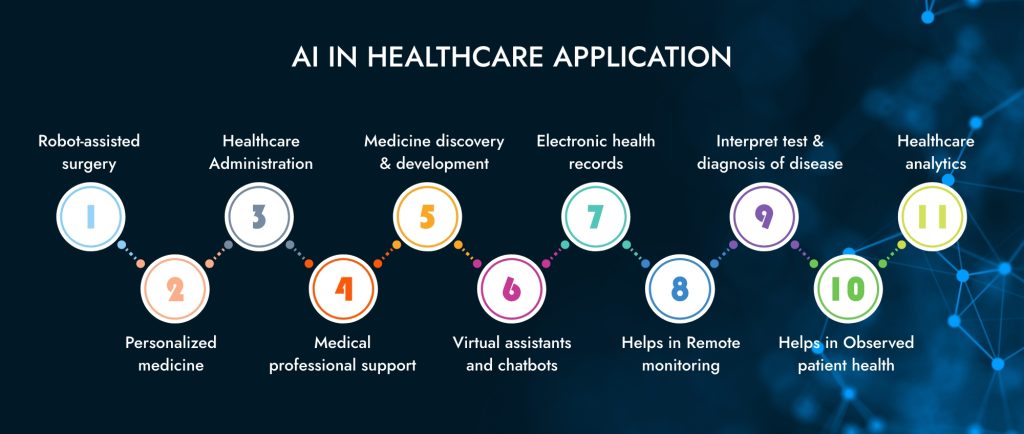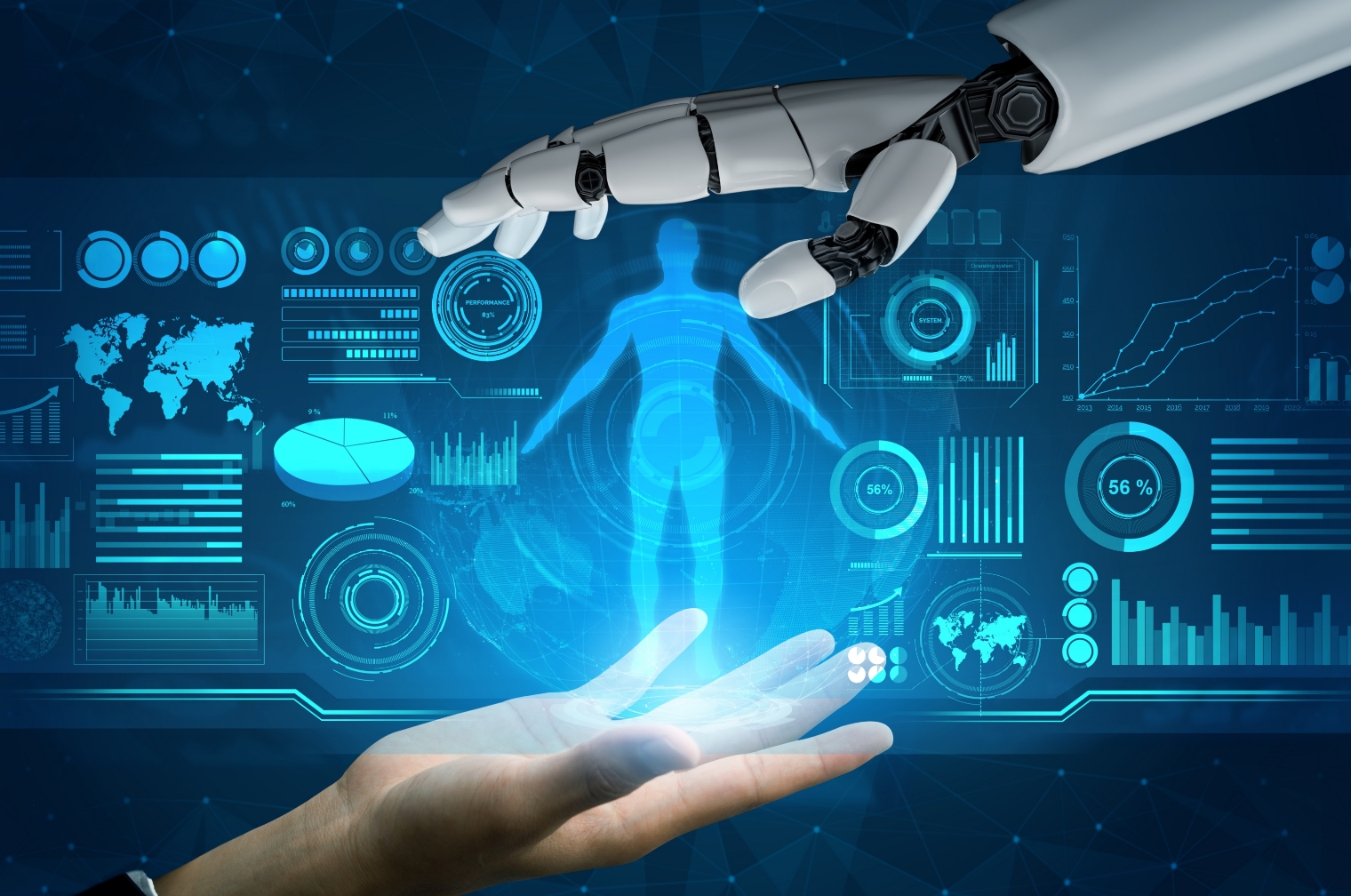In the healthcare industry, challenges such as accurate disease diagnosis, patient engagement, data security, workforce shortages, and medical errors are significant limitations. At ViitorCloud, we understand that these issues can seem uncontrollable. That’s why we offer advanced AI solutions customized to address each of these pain points effectively.
Our AI-powered healthcare solutions go beyond just technology—they’re designed to transform your operations and upgrade patient care. By using advanced data analysis, AI-driven drug discovery, remote monitoring, and predictive analytics, we designate healthcare providers to work more efficiently and deliver better outcomes. Our virtual health assistants streamline patient interactions, while our AI tools optimize operational workflows, guaranteeing that your healthcare facility runs smoothly and securely.
At ViitorCloud, we don’t just implement AI—we integrate it seamlessly into your healthcare ecosystem, driving innovation and improving lives. Let us show you how our expertise in AI development can help you control the full potential of AI in healthcare, transforming your services and boosting patient satisfaction. Explore the top applications of AI in healthcare with ViitorCloud and take the first step toward a smarter, more efficient future for your healthcare business.
AI Application in Healthcare
In the global market, the value of AI in USD is 20.9 billion in 2024, estimated to reach USD 148.4 billion by 2029. AI in healthcare applications offers various benefits to patients and healthcare providers. It helps healthcare organizations detect diseases and helps in personalized treatment and decision-making. AI provides accurate information, which helps improve the healthcare industry.
Let’s understand the applications of AI in healthcare in detail.

1. Robot-Assisted Surgery
AI algorithms made the surgery procedure smooth and efficient. The surgeon can remotely control the robotic arm equipment with AI, enhancing accuracy during risk and complex procedures. Additionally, it opens the opportunity for the invasive surgeon, reduces the risk of errors, and shortens the period of patient recovery.
A robotic surgery system includes a mechanical and camera arm with a surgical instrument attached. A surgeon controls the arms from a control center, and it can see the 3D view of the surgical site. This is the way AI applications in healthcare are helpful to healthcare organizations.
2. Personalized Medicine
AI helps create personalized medicine by providing patients with information such as lifestyle choices, medical issues, and environmental factors. As a result, patients’ health improved, and they started to focus on their health by eating healthy food and exercising. Furthermore, by analyzing the data, AI helps prevent disease and improve the patient’s overall health. The data analysis includes lifestyle choices, genetic predispositions, and environmental factors.
Additionally, AI can analyze patient outcomes of the treatment, which helps refine and optimize the treatment plans. This process ensures that patient outcomes are improving over time. Moreover, implementing AI in personalized medicine improves patients’ health.
3. Healthcare Administration
The medical facility providers are friendly and helpful, but excellent services are not provided due to structural barriers. The structural obstacles include scheduling, confirming, or rescheduling appointments. It is solved with AI as it helps improve the scheduling process. Also, AI simplifies the billing and claim process. When businesses streamline the rote functions, it reduces errors and frees workers to focus on essential tasks.
For instance, an AI chatbot helps handle patient inquiries and responds quickly based on information such as patients’ electronic medical records. As a result, patients are satisfied.
4. Medical Professional Support
AI in healthcare applications helps diagnose diseases, treat them, provide patient care, and make decisions. AI analyzes medical data, patient records, and lab results and uses scans to diagnose the disease. As a result, healthcare providers can give personalized treatment to patients. Additionally, AI helps in decision-making by providing real-time guidance during complex times or challenging disease diagnoses.
Furthermore, AI provides medical education to healthcare providers with access to information. The information is in case studies, medical literature, and virtual simulations. This helps healthcare providers stay updated with the latest medical information and improve their clinical skills.
5. Medicine Discovery and Development
AI uses machine learning algorithms to analyze chemical and biological data to identify medicine efficiency. Also, it uses machine learning algorithms to create predictive models that estimate properties like toxicity, solubility, and bioavailability. These models improve the efficiency and safety of drug candidates. AI helps discover new therapeutic for existing drugs, reducing costs and time. Also, it helps identify new uses for medications.
Additionally, AI helps discover similar diseases, people, and characteristics through biomarker identification and predictive modeling. As a result, personalized treatment is provided to patients, leading to a higher success rate in drug development and improving patient outcomes. It is one of the most important applications of AI in healthcare.
6. Virtual Assistants and Chatbots
A virtual assistant is one of the healthcare AI solutions that satisfies the customer. Customer satisfaction is essential in healthcare and can be provided by quickly solving queries. AI virtual assistants solve customers’ queries 24/7 without having any load on staff workers. Also, chatbots engage with customers who are friendly, like human beings, and transfer communication to another channel if anything is required.
Virtual assistance helps healthcare organizations respond to 5000 customers at a single time. Also, it reduces patients waiting time to solve their queries, and virtual assistants provide personalized interaction to the patient with their name. Additionally, chatbots provide accurate information based on research instead of false information.
7. Electronic Health Records
Electronic health records provide the healthcare organization with details about patients. The details of the patient’s medical history include medical conditions, laboratory test results, demographic data, treatments, and more. AI has made this process efficient and productive in healthcare. The AI tools have transformed the unstructured data of medical records and insurance claims into structured data.
Additionally, AI can identify patterns of diseases and provide personalized treatment to patients. As a result, patient outcome improves. Furthermore, AI’s ability to analyze data to offer diagnosis assistance, disease progress, prognosis, and treatment recommendations helps healthcare providers make the right decision.
8. Helps in Remote Monitoring
Remote patient monitoring with AI helps in the real-time monitoring of patient health, which helps in the early detection of disease. AI continuously monitors patient essential signs, medication adherence, and key health indicators, which detect disease early. Another benefit of remote monitoring is that it provides personalized treatment plans. As a result, healthcare costs are reduced, and the need for hospitalization.
Furthermore, remote monitoring helps patients self-manage as they can monitor their health. Also, patients can make informed decisions about their health and communicate effectively with healthcare providers.
9. Interpret Test and Diagnosis of Disease
Artificial intelligence analyzes medical data to interpret patterns and provide predictions regarding disease. For this analysis, AI uses various medical tools. The AI transforms radiology tools to detect the disease in image form with X-rays and MRIs. In pathology, AI analyzes laboratory test results and tissues. The AI software assists in examining slides and identifying anomalies and cellular patterns. As a result, cancer cells can be detected.
Furthermore, AI systems assist healthcare providers in making personalized treatment plans for cardiac patients. Additionally, AI analyzes brain scans to detect complex neurological conditions. It also detects abnormalities in MRI and CT scans efficiently and accurately.
10. Helps in Observing Patient Health
AI uses machine learning and data analytics to analyze data from electronic health records and medical imaging to get insights into patient diseases, predict health trends, and detect anomalies. Also, real-time monitoring helps prevent diseases before they occur in the patients.
Additionally, AI helps in remote patient monitoring, where doctors can assist patients in remote areas where patients do not need to travel. Ultimately, observation of patient health helps create accessible healthcare solutions.
11. Healthcare Analytics
Healthcare analytics is one of the important AI applications in healthcare. The compass of machine learning, data analytics, and artificial intelligence helps get insights into diseases and patterns. When diseases are known, AI provides personalized treatment to improve patient outcomes. AI helps predict the risk of diseases in patients before disease occurs so the patient’s life can be saved.
Additionally, healthcare analytics is vital for improving operational efficiency and resource allocation in healthcare organizations. It analyses resource allocations, staff patterns, and patient flows, which helps optimize healthcare workflow, reduce wait time, and satisfy patients.
Also Read: How AI Is Transforming Healthcare Startups: Key Benefits and Insights
Ready to transform healthcare with AI? Partner with ViitorCloud for advanced AI solutions tailored to your healthcare needs.
How Viitorcloud’s AI Solutions Help to Reduce Healthcare Cost
At ViitorCloud, we don’t just integrate AI into healthcare, we revolutionize it. By using our progressive healthcare AI solutions, your business can exceptionally reduce costs while expanding access to underserved communities. Here’s how our applications of AI in healthcare can transform your operations and upgrade patient care.
Our AI tools are designed to optimize your administration process, automating everything from appointment scheduling to claims processing and billing. By reducing manual errors and cutting overhead, our solutions free up your healthcare professionals to focus on what matters most patient care while also pushing down operational costs.
Our AI solutions bring healthcare to your patients, no matter where they are. Remote monitoring allows patients to receive top-tier care from the comfort of their homes, preventing the need for costly and time-consuming travel. This not only enhances accessibility but also significantly reduces costs, all while improving health outcomes.
Misdiagnoses are costly and can lead to unnecessary treatments. Our AI-driven diagnostic tools provide accurate, timely diagnoses, empowering your healthcare professionals to make informed decisions that save your patients money and deliver better outcomes.
Efficient resource management is critical in healthcare, and our AI solutions make it seamless. By analyzing patient data, we help you predict staffing needs, manage patient admissions, and streamline inventory management, ensuring resources are allocated efficiently and costs are minimized.
Every patient is unique, and their treatment should be too. Our AI analyzes individual patient data to develop personalized treatment plans, leading to better patient outcomes and reduced costs associated with ineffective treatments.
Our AI chatbots provide round-the-clock support, offering patients basic information and guidance. This reduces the burden on emergency services, cuts costs, and ensures patients receive the care they need when they need it whether it’s a simple consultation or an urgent in-person visit.
Prevention is better and cheaper than cure. With our AI, you can run targeted health campaigns that identify and mitigate the risk of chronic diseases before they escalate. By focusing on prevention, you can reduce treatment costs and allocate resources more effectively.
With ViitorCloud create a healthier, more efficient future for your healthcare business. Our AI development services are tailored to meet your specific needs, helping you achieve your business goals while delivering the highest quality care.
Bring AI innovations to your healthcare practice. Collaborate with ViitorCloud to integrate AI applications that revolutionize patient care.
How can ViitorCloud assist with your healthcare challenges using an AI solution?
Artificial intelligence is revolutionizing healthcare by addressing critical challenges like disease diagnosis, medical discovery, virtual health assistance, and remote monitoring. But to use the power of AI, you need a partner who understands your unique needs and can deliver tailored solutions.
At ViitorCloud, we specialize in developing and integrating advanced AI applications that help healthcare organizations operate more efficiently and provide exceptional patient care. With our AI development services, your healthcare business can seamlessly incorporate innovative applications that enhance your operations and drive better outcomes.
Ready to transform your healthcare business? ViitorCloud is here to make it happen. Let’s work together to bring your vision to life with AI solutions that deliver real results. Contact us today to get started.
Frequently Asked Questions
AI in healthcare has the potential to transform the healthcare industry by improving patient outcomes, providing patient safety, and diagnosing diseases. Additionally, it helps get affordable healthcare and is accessible to health care in rural or underserved areas.
AI is useful in healthcare for diagnosing diseases and analyzing medical data such as X-rays, MRIs, and CT scans. It is also helpful in transcribing medical documents, drug discovery and development, and improving administration efficiency.
The applications of AI in healthcare are robotic-assisted surgery, personalized medicine, healthcare administration, medical professional support, drug discovery and development, and more. This application makes life easy for healthcare organizations.
In the healthcare industry, AI solutions are disease diagnosis with image analysis, virtual assistants for patient support, predictive analysis for early health detection, remote monitoring, and virtual chatbots to solve patient queries. It is the way AI solves problems in the healthcare industry.

Vishal Patel
Vishal Patel is an experienced Solution Consultant with a proven track record in the information technology and services industry.
